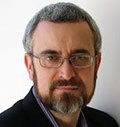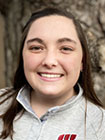UW Department of Family Medicine and Community Health (DFMCH) supervisors attended the virtual training, “Learning at a Distance: Managing Virtual Staff and Teams,” in December. The daylong course, offered through UW Continuing Studies, focused on the differences between virtual and onsite teams, the best practices to develop and maintain trust among team members, and managing virtual team meetings in a way that engages members and promotes decision-making.

Justin Knupp, MBA
The move to remote work for almost all DFMCH non-clinical staff was swift at the start of the COVID-19 pandemic in March. After almost 10 months, supervisors and staff have adapted and even thrived in this unique environment, though it can be challenging to maintain the same team spirit through a computer screen. “With virtual meetings, I’ve noticed how much I miss the nonverbal cues from in-person meetings or the quick hallway discussions,” said Justin Knupp, MBA, IT director and co-interim administrator. “This course made me rethink how I’ll work with project teams moving forward. I initially thought that more frequent meetings would help people feel connected, but I’ve learned that fewer and more directed meetings with staff are more productive.”

Megan Ringo
Research Program Manager Megan Ringo agrees that the loss of in-person communication is a challenge and is especially difficult for newer staff. “I’m new in my role, and I’ve been working to connect with my team one-on-one to resolve any conflicts and help problem solve,” added Ringo. “The course emphasized revisiting the purpose and vision of the organization and that’s something I’d like to work on with our team as we move forward in any environment to clarify roles and projects.”

Michelle Riley
For some, the training reinforced strategies that were already working. “I’ve always had an open door policy,” said Michelle Riley, director of Physician Compensation, Billing and Reimbursement. “That has continued as an open virtual policy. My staff can reach out and ask questions or talk to me at any time, and they have continued to be great communicators.”

Elizabeth Bingman
Director of Educational Services Elizabeth Bingman felt the training was important as the temporary situation evolved into a more permanent one in 2020. “The Education teams always functioned wonderfully in person and this carried over fairly well into the remote environment,” shared Bingman. “While there are always workarounds to manage, this training showed me that our team members function with a level of autonomy and do not need to rely on others to get the job done. Because of this, part of my role is to act as a bridge for communication regarding the overall purpose of the team.”
Though it is unknown when the department will be back in their headquarters at Alumni Hall to enjoy hallway chats or conference room meetings, DFMCH staff remain committed to their work and supervisors are devoted to creating a welcoming and productive virtual space for all.
Published: January 2021
